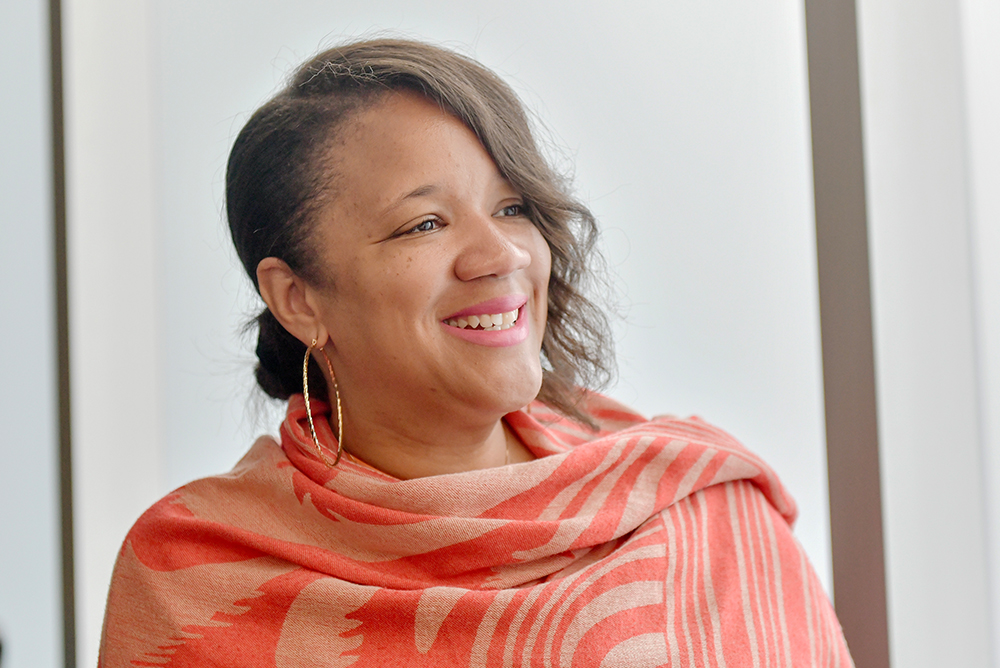
Photo by Brandon Dill.
Robin Rue Simmons is the founder and executive director of the nonprofit First Repair, which promotes local reparations policies around the country to help Black Americans secure financial redress. Before joining Zócalo at the Lorraine Motel in Memphis for for “Why Isn’t Remembering Enough to Repair?”—the third public program in our two-year events and editorial series, “How Should Societies Remember Their Sins?,” presented in partnership with the Mellon Foundation—she shared stories in the green room about forest bathing, her Double Dutch aspirations, and hip-hop’s 50th anniversary.
You’re from Evanston, Illinois. Where was your favorite place to go growing up?
Family Focus. It was a community center, and my grandmother worked there. It was like my third place. There were a lot of staff on site that were like mentors and extended family. And there was a ton of activity. And there were free arts and crafts materials, and a dance studio. And I just felt like it was our sort of kingdom as young people.
Where would we find you on a typical Saturday?
My work has taken me far and wide. On Saturdays I’ve been doing events. And just this past Saturday I was in Georgia and there was an African festival; we had a screening of The Big Payback. We also had a great time at their festival where I was able to speak to the attendees. If I’m not out doing work in the field, then a Saturday at home for me is late-rising, slow-moving, raw food, flowers—whether I’m going to a garden or getting fresh flowers and making an arrangement for my house—and definitely music, preferably live music. If not live music, then great music at home on my soundbar, and just some sunshine.
You’re working on a documentary on the 50th anniversary of hip-hop. How did that come about?
This year I was a fellow at the University of Chicago and at my last public event I had a panel discussion celebrating 50 years of hip-hop, but focusing on hip-hop and activism and social justice; political rap, specifically. That really birthed an idea to launch a documentary that centers around political rap, its early history, how it has driven social and racial justice, and really, how it can do more.
What is your hidden talent?
I learned to Double Dutch at Family Focus. It was just something that you learned to do. You learned to turn, you learned to jump. Recently in the last few years, I joined a Double Dutch club for women over 40 [Forty+Double Dutch Club]. Unfortunately, because I’m traveling so much, I haven’t been able to jump as much and go to my playdates with the women. But they are now traveling across the nation and doing half-time shows.
What I love about the group is it’s so much more than Double Dutch. It really is a sisterhood. It’s a safe place. It’s inter-generational, so you have to be 40, but there are women who are 80 and everywhere in between.
What do you do to decompress?
Forest bathing. It’s a part of my wellness plan and self-care. I didn’t know that I was an environmentalist until I was elected [alderman of the 5th Ward of Evanston]. We got to hear about all the special interests, and the environment community captured me. Not just environmental justice, but also our natural environment as a form of wellness and self. This past week, I only had time to sit under a tree in front of the hotel. But I was very conscious and aware of that tree in that space and in the wind.
When have you experienced a genuine effort to repair?
The work we’re doing right now [at FirstRepair]. It’s beyond apology and ceremony. It’s beyond remembering. It’s taking action on justice for the Black community, which is reparations. I have to shout out my city, the great Evanston, Illinois, that has had the audacity to begin this work.



